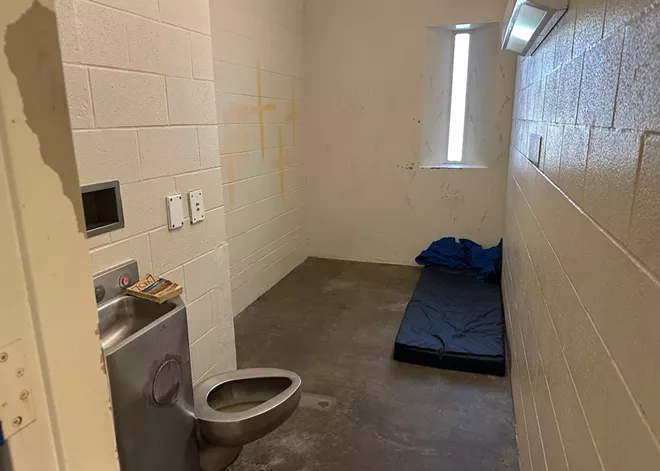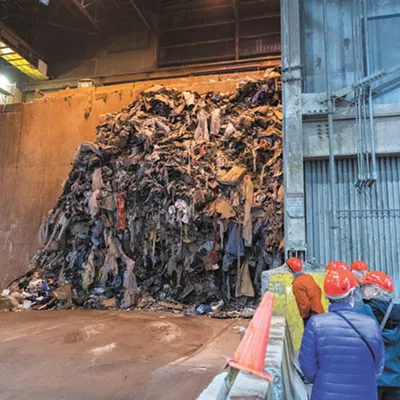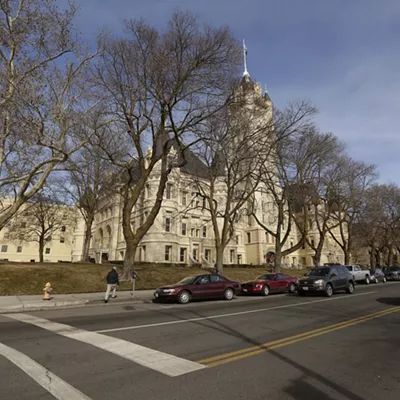
Virtually everyone weighing in on Spokane County's Measure 1 agrees that the current county jail system isn't working well for incarcerated people or the ones who work there.
To address problems with overcrowding, understaffing and a lack of programming at the deteriorating facilities, Spokane County is asking voters to approve a 0.2% increase in the local sales and use tax on Nov. 7. It would cost people 20 cents more for every $100 purchase they make in the county.
The county would receive 60% of the estimated $1.7 billion the public safety tax is expected to bring in over the next 30 years. The plan is to spend more than $500 million (including interest payments) to build a new jail directly north of the current facility downtown, as well as a new community corrections center, where classes and behavioral health treatment could be offered.
The Board of County Commissioners would ultimately decide how the money is spent on criminal justice, public safety or behavioral health, as required by state law. It could pay for prosecutors, public defenders, deputies or other safety-related needs.
Cities throughout the county would receive the other 40% of the revenue, based on their share of the population. City council members in each jurisdiction could similarly spend the money on everything from police officers to service providers.
Proponents argue that more jail space is needed to hold criminals accountable and offer programs that can reduce recidivism and slow crime rates. Opponents argue the plan isn't specific enough to show where the money will be dedicated, and they question the intelligence of expanding a system that isn't working well.
THE PITCH AND REBUTTAL
On any given day, more than 800 inmates are split between the downtown jail, the Public Safety Building and Geiger Corrections Center.
The downtown jail opened in 1986 and was designed to hold 462 people. Cells designed for one often hold two or three people, and inmates often only get to leave their cell for an hour a day.
The Public Safety Building is the former county jail that opened in 1970 and houses the sheriff's office and district court. It has 124 beds and connects the downtown jail building, to its direct north, with the courthouse.
Geiger houses low-level offenders in converted former military barracks near the airport. It can hold 362 people, but typically has half that many due to a lack of staffing and the minimum security requirements to be housed there. Currently, it's the only place where rehabilitative classes are offered.
The majority of people (75% or more) in the jail are legally considered innocent and are awaiting trial. About a fifth of the people housed there are convicted and serving sentences of less than a year, or are waiting to be transferred to prison for longer sentences, according to county data.
About 14% of the people who are brought to the jail are booked and immediately released due to overcrowding, according to county staff members who note that since 1986, Spokane County has grown from 355,000 people to 555,000.
"The reality of it is, we have to hold people accountable," Spokane County Sheriff John Nowels says.
There's an especially urgent need to address substance use disorder, which often plays a factor in crimes such as theft and burglary, and affects many homeless people — it contributed to dozens of overdose deaths in that local population last year, he says.
"If we can start holding people accountable through the criminal justice system for drug use, we can start pushing people into treatment," Nowels says. "Can a jail and a criminal justice system that can effectively deal with drug addiction help our homeless population? It absolutely can."
But while the county's pitch is that more beds are needed to alleviate crowding and offer humane treatment options, people who've been incarcerated say that writing a "blank check" for the county to keep doing things the same way won't help reduce crime.
Community activists have started the political action committee Justice Not Jails to urge voters to vote "no" on Measure 1, noting that the best way to address the societal issues that factor into criminal behavior is to get people into treatment and out of poverty.
"In all of the time I ever spent there, there was nothing in that jail, nothing in any of the jails that I ever went to, that was therapeutic for me, that helped me," says Angel Tomeo Sam, the campaign manager for Justice Not Jails, who spoke last weekend at a Peace and Justice Action League of Spokane conference. "It's trauma from the time before you're arrested and booked in, it's trauma all through the duration of your time, and it's trauma that lingers even after you're released. The solutions are in our community, they're not in that box."
ADDRESSING ROOT ISSUES
Tomeo Sam, a member of the Confederated Colville Tribes, is the co-founder of YoYot Spq'n'i, a nonprofit that works with Indigenous people to prevent and escape violence, and she's also a peer reentry navigator. She says it's important to focus on services that people need.
"Being a person with lived experience in that jail — I'm an addict in recovery, I'm also in recovery from mental health illness, I'm a survivor of homelessness — I have this unique opportunity to connect with folks on that level," she says. "If we have the ability to bolster community resources and vital services in the community, then that's what we should do."
Sheriff Nowels says he's watched a close family member's struggle with opioid addiction and knows how hard it can be to get someone to go through treatment. His hope is that with the expanded jail facilities, the county will be able to offer a therapeutic setting for withdrawal at booking, as well as medication-assisted treatment such as suboxone.
He says the community is suffering impacts from the state Supreme Court's 2021 Blake decision, which found Washington state's criminal drug possession laws to be unconstitutional. In reaction, state lawmakers wanted to see whether it would be more effective for officers to offer people addiction treatment rather than jail time. Nowels says people didn't accept the offer.
"There's no negative consequence for either not participating or for failing in your treatment. An empty jail bed, or at least the idea that you could be put in jail if you don't participate in treatment or you don't successfully complete treatment, if that's not there, people don't take advantage of it," Nowels says. "You have to interrupt the cycle of addiction and get them the support they need. This measure will allow us to do that."
Tomeo Sam says there have been many opportunities to talk about better treatment options and how best to invest taxpayer money. She argues that it's bold of the county "to write themselves a $1 billion check without a plan."
"The folks that need help, we kind of have to meet them where they are and then have this opportunity available to them over and over and over," Tomeo Sam says. "It really is about getting to the root causes of why people are there."
Nowels says that those who don't want increased jail capacity should be clear about their motivations.
"What they're not telling people is in their opinion, we shouldn't be holding people accountable for committing crimes," Nowels says. "We shouldn't be victim focused, we should be offender focused, and that's backwards. We do need to make sure that we're providing treatment to people, but we can't do it on the backs of victims."
Opponents are just as skeptical of the motivations of those backing Measure 1.
Kurtis Robinson, founder of the advocacy group I Did the Time and president of the local NAACP, says the rushed manner in which Spokane County Commissioners Josh Kerns and Al French voted to put the sales tax measure before voters last December set off his radar.
"The question is, what are they really trying to do?" Robinson says. "You're trying to build a new jail again without addressing the core issues behind why that jail is so dysfunctional."
While county leaders are making the case that new facilities will enable them to offer programs that can treat the needs that people have, Robinson argues that the county hasn't proved that's their goal.
"[They're saying] we really plan on just trying to do what we've always been doing, which is have a system that disproportionately impacts people of color and the poor," Robinson says. "If your intent is to really start dealing with social problems and the problems that are creating the need for people to have a timeout in any kind of carceral system, then your first move you're going to make is not going to be to build a bigger holding facility. It's to get to the social and economic woes that are creating the situations and circumstances that push people into those actions. Mental health. Access to health care. Access to drug treatment, all of those things." ♦
QUICK FACTS
MEASURE 1 IS NOT PROPOSITION 1
Voters in the city of Spokane will get ballots featuring two issues with “1” in the title.For MEASURE 1, voters countywide will be asked whether they approve or disapprove of a 0.2% sales and use tax increase, which can only be spent on criminal justice, public safety, correctional infrastructure and behavioral health.
For PROPOSITION 1, voters inside Spokane city limits will be asked whether they think the city should change its code to ban camping within 1,000 feet of schools, parks, playgrounds or child care facilities.
DIDN’T WE ALREADY VOTE ON THIS?
In August 2019, Spokane County voters agreed to extend a 0.1% sales and use tax for public safety and criminal justice through the end of 2029.The 0.1% public safety tax was first approved in 2004, and extended in 2009 and 2019.
Under state law, counties may levy up to 0.3 percent sales and use taxes in that category. Measure 1 asks voters to approve the remaining 0.2 percent for 30 years.
HOW WILL THIS AFFECT SALES TAX?
The state’s sales tax rate is 6.5%, and cities and counties can collect their own tax on top of that.The effective sales tax rates in Spokane County range from 8.1% to 9.1% depending on the jurisdiction (with local rates of 1.6% in small towns up to 2.6% in Airway Heights). If Measure 1 is approved, that would INCREASE TO 8.3% TO 9.3%.
HOW MANY BEDS WILL THIS ADD?
The existing jail spaces were designed for:- 462 beds at the downtown jail
- 124 beds in the Public Safety Building (which was the county jail from 1970 to 1986)
- 362 beds at Geiger Corrections Center.
- 462 beds maintained at the downtown jail
- 768 beds in a new multistory jail downtown
- 128 beds in a new community corrections center on the same campus.

























